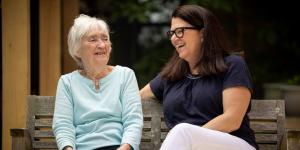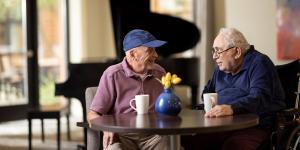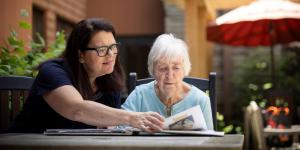What Matters to People Living With Dementia and Their Caregivers?
Discover what’s important to people with dementia and their caregivers in their own words.
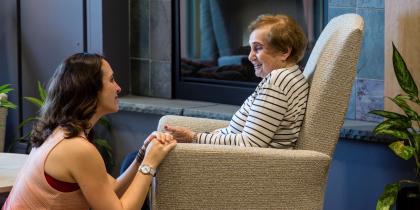
“We need a care team to follow us, to be with us, to become part of our journey that has different levels of expertise that we don’t necessarily have already. We come with assets, yes. We come with the love that we have for our family, care recipient, yes, but we also need so much more.”
That quote from the caregiver of a person living with dementia is one of many insights that emerged during a series of meetings with the Lived Experience Panel, a coordinated effort between the National Institute on Aging IMbedded Pragmatic Alzheimer's Disease and AD-Related Dementias Clinical Trials Collaboratory (NIA IMPACT Collaboratory) and the Alzheimer’s Association.
The IMPACT Collaboratory is an NIA-funded research collaboratory that supports clinical trials of non-drug interventions in real-world settings to improve the quality of life of people living with dementia and their care partners. “Promoting health equity in dementia care for all Americans is a major public health priority and central to IMPACT’s mission. This panel was so important because it helped IMPACT focus its work on what matters most to the people living with dementia and their care partners from different backgrounds,” says Susan Mitchell, MD, MPH, the principal investigator for the NIA Impact Collaboratory, professor of medicine at Harvard Medical School, and senior scientist at Hebrew SeniorLife’s Hinda and Arthur Marcus Institute for Aging Research.
Throughout multiple conversations, the panel brought together the people most impacted by dementia to share their thoughts on care and research: people living with dementia, caregivers, and caregivers representing the perspectives of one or more people living with middle- or late-stage dementia or who have died.
The 2022-2023 Lived Experience Panel Report, Voices of the Lived Experience Panel: Health Equity in Dementia Care and Research summarizes the main themes that emerged during the panel. It is the third report in a series of efforts meant to reflect members' perspectives and experiences related to a specific topic — in this case, dementia care and research.
Here are some of the main takeaways from the report, which is also available in Spanish:
Health inequities add challenges to an already difficult process
The journey to getting a dementia diagnosis, understanding the condition, and navigating next steps is hard enough on its own. Too often, that journey is made even harder because of health inequities. Panelists talked about experiencing inequity due to their age, race, ethnicity, citizenship status, culture, geographic area, lack of social support, language, and socioeconomic status.
“As an African American, very few of us are even involved in early Alzheimer’s support. So, imagine that is a whole lot more missed opportunities for us because there are many of us that seek out those resources and seek out the support groups (yet don’t receive them),” said one person living with dementia.
Two national Alzheimer’s Association surveys found that Black Americans report the highest level of discrimination in dementia health care. The same surveys found that over half of non-white caregivers say they have faced discrimination when navigating health care settings for their care recipient. Survey respondents said that their top concern is that providers or staff don’t listen to what they are saying because of their race, color, or ethnicity.
Social support was another inequity that stood out. One panelist became a caregiver as a young woman while raising her own young children because, in her own words, “no one in her family stepped up… and family members did not want to acknowledge what was happening.”
She went on to say that many families have one designated person, usually a woman, who is left to “walk with their loved one.” Alzheimer’s Association data shows this is true — more than three in five unpaid Alzheimer’s caregivers are women, and female caregivers spend more time caregiving on average than their male counterparts.
Missed information leads to missed opportunities
Receiving a dementia diagnosis is overwhelming. Getting the information needed to learn about symptoms, treatment, and care can be a fragmented and confusing process. Some panelists mentioned receiving conflicting information, making things even harder.
Caregivers might not even know which questions they should ask. What they do know is that they want easier access to answers to questions like:
- What do best care practices look like?
- Where can they go for help?
- Are there any research opportunities available for them to participate in?
- Where should they go if they don’t know what they need to learn?
- Where can they receive guidance on care needs?
- To whom should they be asking these questions?
People with dementia need to be taken into consideration too. One person living with dementia felt that there was more information directed toward helping caregivers than there was helping people who were living with the disease. Others talked about realizing that they missed out on opportunities due to not knowing about them, like new drugs or treatment programs.
Those realizations can be challenging to process. Even though she knew she had done her best as a caregiver, one panelist felt “cheated and as if [she] let [her] mama down by not knowing what was available.” She asked the question, “How do you find out what is available if you don’t know to ask, ‘What’s available?’”
A one-size-fits-all approach post-diagnosis isn’t good enough
For years, people diagnosed with dementia have been pointed to the Alzheimer’s Association for information on what they should do next. According to panelists, that can feel generic and impersonal.
Panelists talked about wanting a tailored and personalized approach to post-diagnostic guidance and care. One caregiver commented that “no two cases are the same, therefore identifying best practices is complex.”
People living with dementia and their families have different needs as the disease progresses. Care should align with not only their disease trajectory but also with their individual needs and preferences. Health care providers need to be respectful across the entire course of the disease to maintain a trusting relationship with people with dementia and caregivers.
One caregiver suggested a “‘team care approach’ wherein people could be paired with a ‘group of people that we can walk this journey with’” at diagnosis and as the disease progresses.
Dementia research should be more inclusive
A lack of diversity in dementia research came up as a point of frustration for some of the panelists, with one person living with dementia mentioning that African Americans were more likely to be excluded from participating in studies due to pre-existing conditions.
Even though Black Americans are twice as likely as white Americans to have Alzheimer's or another form of dementia, they are screened out of clinical trials at higher rates. According to the Washington University School of Medicine in St. Louis, African Americans make up about 20% of Alzheimer’s patients but just 2% of Alzheimer’s clinical trial participants.
“As a person living with dementia, I have been excluded from research even after completing a very long application for not being at the right dementia stage, being too old, too young, or not being Hispanic. It’s kind of aggravating,” said another person living with dementia.
Giving people with dementia and their caregivers a voice
Even though people living with dementia and their caregivers are the people most impacted by the disease, it’s rare for researchers to directly hear their thoughts and feelings about the state of dementia care and research.
While each panelist came in with their own unique lived experience and set of circumstances, their shared perspectives highlighted a few areas that mattered to them most.
Four of the key takeaways that emerged during the conversations were:
- Health inequities add challenges to an already difficult process
- Missed information leads to missed opportunities
- A one-size-fits-all approach post-diagnosis isn’t good enough
- Dementia research should be more inclusive
When reflecting on their panel experience, a final takeaway became clear — participants didn’t feel invisible anymore and it felt good to know they had been heard, understood, and represented.
Get dementia support in Greater Boston
Our Family Caregiver Program at the Deanna and Sidney Wolk Center for Memory Health provides support to family caregivers and their loved ones with dementia. We are committed to supporting each patient’s unique needs and goals, offering personalized interventions designed to slow symptom progression, decrease disability, and improve quality of life. We also offer individual and family counseling and in-person and virtual caregiver support groups, grief support groups, and caregiver support groups led by licensed clinicians.
If you or someone you know is a caregiver to someone with dementia and could use extra support, we are here to help. Contact us today to learn more.
Blog Topics
Learn More
Free Guide to Brain Health
Download our free guide, “Optimizing Your Brain Health,” for expert advice on boosting brain health at any age. Explore practical tips and resources from Hebrew SeniorLife’s Deanna and Sidney Wolk Center for Memory Health.
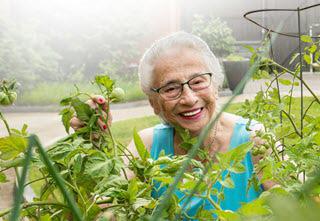
Memory Care
Our care team helps people with advanced Alzheimer's disease and other forms of dementia feel safe and stimulated, while maintaining a connection to community.
